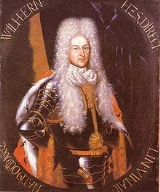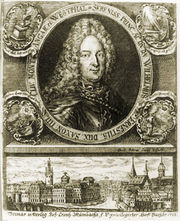
William Ernest, Duke of Saxe-Weimar
Encyclopedia
Wilhelm Ernst, Duke of Saxe-Weimar (19 October 1662 – 26 August 1728) was a duke of Saxe-Weimar.
He was born in Weimar
, the eldest son of Johann Ernst II, Duke of Saxe-Weimar
and Christine Elisabeth of Holstein-Sonderburg.
When his father died in 1683, he succeeded him as duke; however, he was compelled to rule jointly with his younger brother Johann Ernst III.
Because Johann Ernst III was alcoholic, Wilhelm Ernst took full control of the government of the duchy and permitted Johann Ernst the nominal title of co-duke (Mitherr) until his death in 1707. After the death of his brother he made Johann Ernst's son, Ernst August I, co-duke, but with no real power.
Six months after the death of his father (2 November 1683), Wilhelm Ernst married in Eisenach
with Charlotte Marie
, his cousin and eldest surviving daughter of his uncle Bernhard II, Duke of Saxe-Jena
, in order to secure the family lands. At that time, the guardian of Charlotte and his younger brother, the duke Johann Wilhelm of Saxe-Jena, was the duke Johann Georg I of Saxe-Eisenach, their only surviving uncle. When he died in 1686, the guardianship of the duke of Saxe-Jena was taken by Wilhelm Ernst, his cousin and brother-in-law.
Wilhelm Ernst was a strict Lutheran
and commanded that only men who could read and comment on Lutheran theological writings be admitted to his armed forces. The composer Johann Sebastian Bach
worked for the duke from 1708, first as organist, then as Konzertmeister (leader of the orchestra) in Weimar. When Johann Samuel Drese
died in 1716, Bach solicited his post of Kapellmeister (head of the court musical establishment), but Wilhelm Ernst appointed Drese's incompetent son for the post instead; furious, Bach solicited his dismissal from the Duke's service. Annoyed at Bach's impertinence, Wilhelm Ernst had Bach jailed for four weeks in a fortress before he accepted his dismissal.
 On 23 August 1690, Wilhelm Ernst and Charlotte Marie were divorced after seven years of childless and extremely unhappy union. Two months later, on 4 November, duke Johann Wilhelm of Saxe-Jena
On 23 August 1690, Wilhelm Ernst and Charlotte Marie were divorced after seven years of childless and extremely unhappy union. Two months later, on 4 November, duke Johann Wilhelm of Saxe-Jena
(Charlotte Marie's brother), died without heirs, and Wilhelm Ernst took possession of part of his duchy after a treaty was signed with the Saxe-Eisenach branch of his family.
Wilhelm Ernst never remarried and died at Weimar without heirs; his nephew Ernst August I became his successor.
He was born in Weimar
Weimar
Weimar is a city in Germany famous for its cultural heritage. It is located in the federal state of Thuringia , north of the Thüringer Wald, east of Erfurt, and southwest of Halle and Leipzig. Its current population is approximately 65,000. The oldest record of the city dates from the year 899...
, the eldest son of Johann Ernst II, Duke of Saxe-Weimar
Johann Ernst II, Duke of Saxe-Weimar
John Ernest II , was a duke of Saxe-Weimar.He was the second but eldest surviving son of William, Duke of Saxe-Weimar, and Eleonore Dorothea of Anhalt-Dessau....
and Christine Elisabeth of Holstein-Sonderburg.
When his father died in 1683, he succeeded him as duke; however, he was compelled to rule jointly with his younger brother Johann Ernst III.
Because Johann Ernst III was alcoholic, Wilhelm Ernst took full control of the government of the duchy and permitted Johann Ernst the nominal title of co-duke (Mitherr) until his death in 1707. After the death of his brother he made Johann Ernst's son, Ernst August I, co-duke, but with no real power.
Six months after the death of his father (2 November 1683), Wilhelm Ernst married in Eisenach
Eisenach
Eisenach is a city in Thuringia, Germany. It is situated between the northern foothills of the Thuringian Forest and the Hainich National Park. Its population in 2006 was 43,626.-History:...
with Charlotte Marie
Charlotte Marie of Saxe-Jena
Charlotte Marie of Saxe-Jena , was a German princess member of the House of Wettin in the branch of Saxe-Jena and by marriage Duchess of Saxe-Weimar....
, his cousin and eldest surviving daughter of his uncle Bernhard II, Duke of Saxe-Jena
Bernhard II, Duke of Saxe-Jena
Bernhard II, Duke of Saxe-Jena , was duke of Saxe-Jena.He was the seventh child but fourth surviving son of Wilhelm, Duke of Saxe-Weimar and Eleonore Dorothea of Anhalt-Dessau....
, in order to secure the family lands. At that time, the guardian of Charlotte and his younger brother, the duke Johann Wilhelm of Saxe-Jena, was the duke Johann Georg I of Saxe-Eisenach, their only surviving uncle. When he died in 1686, the guardianship of the duke of Saxe-Jena was taken by Wilhelm Ernst, his cousin and brother-in-law.
Wilhelm Ernst was a strict Lutheran
Martin Luther
Martin Luther was a German priest, professor of theology and iconic figure of the Protestant Reformation. He strongly disputed the claim that freedom from God's punishment for sin could be purchased with money. He confronted indulgence salesman Johann Tetzel with his Ninety-Five Theses in 1517...
and commanded that only men who could read and comment on Lutheran theological writings be admitted to his armed forces. The composer Johann Sebastian Bach
Johann Sebastian Bach
Johann Sebastian Bach was a German composer, organist, harpsichordist, violist, and violinist whose sacred and secular works for choir, orchestra, and solo instruments drew together the strands of the Baroque period and brought it to its ultimate maturity...
worked for the duke from 1708, first as organist, then as Konzertmeister (leader of the orchestra) in Weimar. When Johann Samuel Drese
Johann Samuel Drese
Johann Samuel Drese was a German composer and member of the musical Drese family. In 1683 he was appointed Kapellmeister in Weimar. He was in charge of music when J.S. Bach worked in Weimar in 1703 and 1708. His cousin was Adam Drese.-References:*Oxford Composer Companions, J.S. Bach, 1999, p. 142...
died in 1716, Bach solicited his post of Kapellmeister (head of the court musical establishment), but Wilhelm Ernst appointed Drese's incompetent son for the post instead; furious, Bach solicited his dismissal from the Duke's service. Annoyed at Bach's impertinence, Wilhelm Ernst had Bach jailed for four weeks in a fortress before he accepted his dismissal.

Johann Wilhelm, Duke of Saxe-Jena
Johann Wilhelm, Duke of Saxe-Jena , was a duke of Saxe-Jena.He was the youngest but sole surviving son of Bernhard II, Duke of Saxe-Jena by his wife Marie Charlotte, daughter of Henry de La Trémoille, 3rd Duke of Thouars, 2nd Duke of La Tremoille, and Prince of Talmond and Taranto.-Life:When only...
(Charlotte Marie's brother), died without heirs, and Wilhelm Ernst took possession of part of his duchy after a treaty was signed with the Saxe-Eisenach branch of his family.
Wilhelm Ernst never remarried and died at Weimar without heirs; his nephew Ernst August I became his successor.

